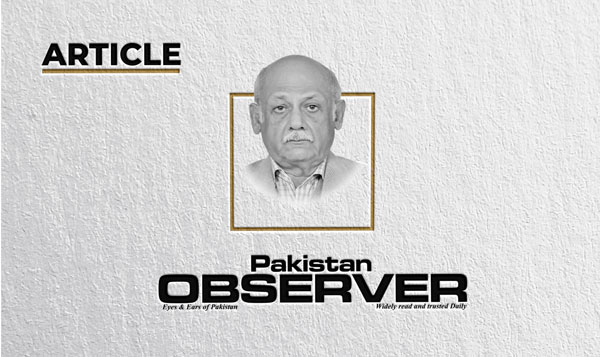Where is Jinnah’s Pakistan?
A few individuals significantly alter the course of history. Fewer still modify the map of the world. Hardly anyone can be credited with creating a nation-state. MA Jinnah did all three.
This is the tribute paid to the father of the nation by Stanley Wolpert a renowned historian, in his biography of the father of the nation.
The charismatic genius MA Jinnah was solely responsible for the creation of the independent state of Pakistan and this miracle could not happen without the undeniable role played by him.
Jinnah’s political vision was ingrained in the principles of rule of law, religious tolerance, separation of state and religion, parliamentary democracy, freedom of speech and thought, good governance, civilian supremacy and across-the-board accountability.
The dream of the Quaid-i-Azam was shattered when on 16 October 1951 Liaquat Ali Khan, the first Prime Minister of the country, was brutally shot dead in Rawalpindi plunging the country in political chaos anarchy and uncertainty that has continued to this day.
On 16 December 1971 Commander Easter Command Lt Gen Amir Abdullah Khan Niazi surrendered to the Indian army and Jinnah’s Pakistan was decapitated.
The vision of Jinnah could survive for twenty-five years only and then the edifice created by Jinnah came crashing down putting in doubt the two-nation Theory.
This was the last nail in the coffin of a united Pakistan because the civil and military leaders of the country were more interested in their political ambitions and not in guarding the integrity of the nation.
The dream of Jinnah’s Pakistan could not be transformed into reality as after the assassination of Liaquat Ali Khan the country was taken over by people who had not contributed anything to the independence from British colonial rule.
The army-bureaucracy-landed aristocracy unholy triangle had the country in its vicious grip in the formative years of independence.
The first constitution of the country was promulgated in 1956 to be thrown in the dustbin by a military dictator in 1958.
Pakistan saw the rule of eight different Prime Ministers from 1947 to 1958 and on the Indian side Jawaharlal Nehru remained PM from 1947 to 1964 and their constitution was promulgated in 1948 and has survived to this day without ever being abrogated and India has never suffered the curse of a military dictatorship.
Jinnah’s vision for a progressive, secular, tolerant and democratic society could not be realized because the ruling elite in the country were hand in glove with the mafias of corruption and nepotism and merit was trampled underfoot with impunity.
The western part of the country was in the grip of feudal lords and tribal elders who were severely lacking in education, political insight or even cultural enlightenment.
In East Pakistan the Bengali population was free of the curse of feudalism, they were better educated and the curse of religious extremism had not taken over the Bengali society.
MA Jinnah was a passionate proponent of political pluralism, separation of state and religion, secular democracy, civilian supremacy and rule of law.
Political successors of Jinnah did not subscribe to Jinnah’s passionate belief in religious tolerance and the rights of non-Muslim minorities and they believed in making Pakistan a theocracy to be governed by the Islamic Sharia.
Had the Quaid-i-Azam lived a few more years the vicious grip of the clergy and the military would have been thwarted?
Jinnah’s speech in the Constituent Assembly on 11 August 1947 was never taken seriously by the political elite and no effort was made to reject the Objectives Resolution of 1949 and block the rising tsunami of religious extremism and dogmatic ideas.
MA Jinnah was an epitome of integrity, honesty, austerity and belief in secular democracy. He had a great contempt for the VIP culture, hated nepotism, abhorred corruption and the lust for power.
Ironically everything hated by the father of the nation became the dominant political culture in West Pakistan and Jinnah’s political vision faded into oblivion.
Pakistan was now on the road to becoming a security state steeped in the cancer of religious intolerance and bigotry.
In its very formative years, Pakistan neglected social and human development and concentrated on advocating a severe external threat perception from our eastern borders that is from India.
Today there are over twenty million children lacking basic education and a large proportion of our citizens are without clean drinking water or a health-care system while we spend the major portion of our resources in building weapons of mass destruction.
Today Pakistan is ranked 144th on human security index, 154th on human development index and 140th on transparency international’s corruption perception index 2022 (among 180 countries of the world) With regard to putting Pakistan on the path of prosperity Jinnah said: “Now if we want to make this great state of Pakistan happy and prosperous, we should wholly and solely concentrate on the well-being of the people, and especially of the masses and the poor.
If you will work in cooperation, forgetting the past, burying the hatchet, you are bound to succeed.
If you change your past and work together in a spirit that every one of you, no matter to what community he belongs, no matter what relations he had with you in the past, no matter what is his colour, caste or creed, is first, second and last a citizen of this state with equal rights, privileges and obligations, there will be no end to the progress you will make. ”
—The writer is Professor of History, based in Islamabad.










